- Home
- Jonathan Stroud
Ptolemy's Gate Page 3
Ptolemy's Gate Read online
Page 3
Mandrake cleared his throat. “Right then. To business. Ms. Piper, we will deal with the ordinary reports first. If you would activate the presence indicator.”
Ms. Piper spoke a brief incantation. Instantly the candles around the perimeters of two of the smaller circles flickered into life; wisps of smoke rose to the ceiling. In the pots beside them, flakes of incense stirred and shifted. The other two circles remained quiet.
“Purip and Fritang,” Ms. Piper said.
The magician nodded. “Purip first.” He uttered a loud command. The candles in the leftmost pentacle flared; with a queasy shimmering, a form appeared in the center of the circle. It was shaped like a man and respectfully dressed in a sober suit and dark blue tie. It nodded briefly in the direction of the desk and waited.
“Remind me,” Mandrake said.
Ms. Piper glanced at her notes. “Purip has been observing the response to our war pamphlets and other propaganda,” she said. “Watching the commoners’ mood.”
“Very well. Purip—what have you seen? Speak.”
The demon bowed slightly “There is not much new to report. The people are like a herd of Ganges meadow cattle, half-starved but complacent, unused to change or independent thought. Yet the war presses on their minds, and I believe discontent is spreading. They read your pamphlets, just as they buy your newspapers, but they do so without pleasure. It does not satisfy them.”
The magician scowled. “How is this discontent expressed?”
“I detect it in the careful blankness of their features when your police draw near. I see it in the hardness of their eyes as they pass the recruitment booths. I watch it pile up silently with the flowers at the doors of the bereaved. Most will not declare it openly, but their anger at the war and at their government is growing.”
“These are just words,” Mandrake said. “You give me nothing tangible.”
The demon shrugged its shoulders and smiled. “Revolution is not tangible—not to begin with. The commoners barely know the concept exists, but they breathe it when they sleep and they taste it when they drink.”
“That’s enough riddles. Continue with your work.” The magician snapped his fingers; the demon sprang out of the circle and vanished. Mandrake shook his head. “All but useless. Well, we’ll see what Fritang has to offer.”
Another command: the second circle flared into life. In a cloud of incense a new demon appeared—a short, fat gentleman with a round red face and plaintive eyes. It stood blinking agitatedly in the artificial light. “At last!” it cried. “I have terrible news! It cannot wait another moment!”
Mandrake knew Fritang of old. “As I understand it,” he said slowly, “you have been patrolling the docks, hunting for spies. Does your news have anything to do with this?”
A pause. “Indirectly …” the demon said.
Mandrake sighed. “Go on, then.”
“I was carrying out your orders,” Fritang said, “when—oh, how the memory appalls me!—my cover was blown. Here is my account. I had been conducting inquiries in a wine shop. As I exited, I found myself surrounded by a tribe of street urchins, some scarcely taller than my knee. I was disguised as a manservant, going about my quiet business. I had made no loud noises or extravagant gestures. Nevertheless I was singled out and hit by fifteen eggs, mostly thrown with force.”
“What was your exact guise? Perhaps that was itself a provocation.”
“I was as you see me. Gray-haired, sober, and straight-backed, the model of tedious virtue.”
“Evidently the young scoundrels decided to waylay a man of such qualities. You were unlucky, that is all.”
Fritang’s eyes widened and its nostrils flared. “There was more to it than that! They knew me for what I am!”
“As a demon?” Mandrake flicked skeptically at a particle of dust upon his sleeve. “How could you tell?”
“My suspicions were aroused by their repetitive chanting: ‘Get out, get out, vile demon. We hate you and your dangling yellow crest.’”
“Really? That is interesting….” The magician appraised Fritang carefully through his lenses. “But what yellow crest is this? I don’t see it.”
The demon pointed at a space above its head. “That is because you cannot see the sixth or seventh planes. On those, my crest is self-evident, resplendent as a sunflower. I may add that it is not dangling, though captivity does make it droop a little.”
“The sixth and seventh planes … and you’re quite sure you didn’t let your guise slip for a moment? Yes, yes.” Mandrake held up a hasty hand as the demon began a vehement protest. “I’m sure you’re right and I am grateful for the information. You will doubtless want to rest after your egg trauma. Be gone! You are dismissed.”
With a yell of delight, Fritang departed in corkscrew motion through the center of the pentacle, as if sucked noisily down a plughole. Mandrake and Ms. Piper looked at each other.
“Another case,” Ms. Piper said. “Children again.”
“Mmm.” The magician leaned back in his chair and stretched his arms out behind his head. “You might just check the files, get the exact number. I must summon the demons back from Kent.”
He sat forward, his elbows on the desk, and made the incantation in an undertone. Ms. Piper got up and crossed to the filing cabinet on the edge of the circle. She opened the topmost drawer and drew out a bulging manila file. Returning to her seat, she removed the elastic around the file and began sifting rapidly through the documents within. The incantation ended amid a suffusion of jasmine and sweetbriar. In the right-hand pentacle a hulking form appeared—a giant with blond, braided hair and a single glaring eye. Ms. Piper went on reading.
The giant performed a low and complex bow. “Master, I greet you with the blood of your enemies, with their cries and lamentations! Victory is ours!”
Mandrake raised an eyebrow. “So you chased them away, then.”
The cyclops nodded. “They fled like mice before lions. Literally, in some cases.”
“Indeed. That was to be expected. But did you capture any?”
“We killed a good many. You should have heard them squeak! And their fleeing hooves fairly shook the earth.”
“Right. So you didn’t capture a single one. Which was expressly what I ordered you and the others to do.” Mandrake rapped his fingers on the table. “In a matter of days they will attack again. Who sent them? Prague? Paris? America? Without captives it is impossible to say. We are no further forward.”
The cyclops gave a crisp salute. “Well, my work is done. I am pleased to have given satisfaction.” It paused. “You seem lost in thought, O master.”
The magician nodded. “I am debating, Ascobol, whether to subject you to the Stipples or the Unfortunate Hug. Do you have a preference?”
“You could not be so cruel!” The cyclops wiggled agonizedly back and forth, toying with a braid of hair. “Blame Bartimaeus, not me! Once again, he took no useful part in the action, but was waylaid by a single blow. I was delayed from the chase by his loud requests to help him up from beneath a pebble. He is as weak as a tadpole and vicious with it: you should subject him to the Stipples forthwith.”
“And where is Bartimaeus now?”
The cyclops gave a pout. “I know not. Possibly he has expired from exhaustion in the interim. He took no part in the chase.”
The magician sighed deeply. “Ascobol—be gone from here.” He made a dismissive sign. The giant’s fluting cries of thanks were abruptly cut off; it vanished in a gout of flame. Mandrake turned to his assistant. “Any joy, Piper?”
She nodded. “These are the unauthorized demon sightings of the last six months. Forty-two—no, forty-three now in total. As far as the demons go, there’s no pattern: we’ve had afrits, djinn, imps, and mites all spotted. But when you look at the commoners …” She glanced down at the open file. “Most are children, and most of those children are young. In thirty cases the witnesses were under eighteen. What’s that? Seventy percent or so. And in over hal
f of those the witnesses were under twelve.” She looked up. “They’re being born with it. With the power to see.”
“And who knows what else.” Mandrake swiveled his chair and stared out over the bare gray branches of the trees in the square. Mists still meandered around them, cloaking the ground from view. “All right,” he said, “that’s enough for now. It’s nearly nine, and I’ve private work to do. Thanks for your help, Piper. I’ll see you at the ministry later this morning. Don’t let that door guard give you any cheek as you go out.”
For some moments after his assistant’s departure the magician remained motionless, tapping his fingers together aimlessly. Finally he leaned over and opened a side drawer in his desk. He pulled out a small cloth bundle and set it down in front of him. Flicking the fabric aside, he revealed a bronze disc, shiny with the use of years.
The magician stared down into the scrying glass, willing it into life. Something stirred in its depths.
“Fetch Bartimaeus,” he said.
3
With dawn, the first people returned to the little town. Hesitant, fearful, groping their way like blind men up the street, they began to inspect the damage wrought to their houses, shops, and gardens. A few Night Police came with them, ostentatiously flourishing Inferno sticks and other weapons, though the threat was long since gone.
I was disinclined to move. I spun a Concealment around the chunk of chimney where I sat and removed myself from the humans’ sight. I watched them passing with a baleful eye.
My few hours’ rest had done me little good. How could it? It had been two whole years since I’d been allowed to leave this cursed Earth; two full years since I’d last escaped the brainless thronging mass of sweet humanity. I needed more than a quiet kip on a chimney stack to deal with that, I can tell you. I needed to go home.
And if I didn’t, I was going to die.
It is technically possible for a spirit to remain indefinitely on Earth, and many of us at one time or another have endured prolonged visits, usually courtesy of being forcibly trapped inside canopic jars, sandalwood boxes, or other arbitrary spaces chosen by our cruel masters.1 Dreadful punishment though this is, it at least has the advantage of being safe and quiet. You aren’t called upon to do anything, so your increasingly weakened essence is not immediately at risk. The main threat comes from the remorseless tedium, which can lead to insanity in the spirit in question.2
My current predicament was in stark contrast. Not for me the luxury of being hidden away in a cozy lamp or amulet. No—day in, day out, I was a djinni on the street, ducking, diving, taking risks, exposing myself to danger. And each day it became a little more difficult to survive.
For I was no longer the carefree Bartimaeus of old. My essence was raddled with Earth’s corruption; my mind was bleary with the pain. I was slower, weaker, distracted from my tasks. I found it hard to change form. In battle my attacks were sputtering and weak—my Detonations had the explosive power of lemonade, my Convulsions trembled like jelly in a breeze. All my strength had gone. Where once, in the previous night’s scrap, I would have sent that public convenience right back at the she-pig, adding a phone box and a bus stop for good measure, now I could do nothing to resist. I was vulnerable as a kitten. A few small buildings in the face, I could stand. But already I was practically at the mercy of second-rate fops such as Ascobol, a fool with no great history to speak of.3 And if I met a foe with even a grain of power, my luck would surely end.
A weak djinni is a bad slave—bad twice over, since he is both ineffective and a laughingstock. It does a magician no favors to maintain one in the world. This is the reason why they usually allow us back to the Other Place on a temporary basis, to repair our essence and renew our strength. No master in his right mind would permit a djinni to deteriorate as far as I had done.
No master in his right mind … Well, that of course was the problem.
I was interrupted in my gloomy cogitation by a stirring in midair. The girl looked up.
Above the road appeared the faintest shimmering—a delicate tingling of pretty pink and yellow lights. It was invisible on the first plane, and thus went unnoticed by the people trudging up the street, but if any children had seen it, they’d probably have guessed it to be fairy dust.
Which shows how wrong you can be.
With an abrupt scratching noise, the lights froze and were drawn back from the middle like two curtains. Between them appeared the grinning face of a bald baby with bad acne. Its evil little eyes were red and sore, indicating an owner who kept long hours and bad habits. For a few moments they peered myopically to and fro; the baby swore under its breath and rubbed its eyes with dirty little fists.
All at once it noticed my Concealment and let out a dreadful oath.4 I regarded it with cool impassivity.
“Oi, Bart!” the baby cried. “That you in there? Stir yourself! You’re wanted.”
I spoke casually. “By whom?”
“You know full well. And boy, are you in trouble! I reckon it’s the Shriveling Fire for sure this time.”
“Is that so?” The girl remained firmly seated on the broken chimney and crossed her slender arms. “Well, if Mandrake wants me, he can come and get me himself.”
The baby grinned nastily. “Good. I was hoping you’d say that. No problem, Barty! I’ll pass that on. Can’t wait to see what he’ll do.”
The imp’s malicious glee irritated me.5 If I’d had a little more energy I’d have leaped up and swallowed it there and then. I contented myself with snapping off a chimney pot and throwing it with unerring aim. It struck the baby’s bald fat head with a satisfactory ringing sound.
“As I thought,” I said. “Hollow.”
The unlovely grin converted into a scowl. “You cad! Just you wait—we’ll see who’s laughing when I watch you burn.” Propelled by a gust of ripe language, it popped back behind its curtains of glimmering lights and drew them smartly together. Twinkling softly, the lights dissipated on the breeze. The imp was gone.
The girl pushed a strand of hair behind one ear, refolded her arms grimly, and settled back to wait. Now there would be consequences, which was exactly what I needed. It was time for a proper confrontation.
To begin with, years before, my master and I had got along well enough. I don’t mean amicably, or anything ridiculous like that, but our mutual irritation was founded on something approximating respect. During a series of early incidents, from the Lovelace conspiracy to the golem affair, I’d been forced to acknowledge Mandrake’s verve and daring, his energy and even (faintly) the glimmerings of his conscience. It wasn’t much, admittedly, but it made his prissiness, stubbornness, pride, and ambition a little less hard to stomach. In return, I obviously had no shortage of wonderful traits for him to admire, and anyway, he could barely get up in the morning without needing me to save his sorry skin. We coexisted in a wary state of toleration.
For a year or so after the defeat of the golem and Mandrake’s promotion to Head of Internal Affairs, he didn’t push me around too much. He summoned me from time to time to help out with minor incidents, which I haven’t got time to go into here,6 but generally speaking he left me pretty much alone.
On the odd occasion that he did call me, we both knew where he stood. We had an agreement of sorts. I knew his birth name, and he knew I knew it. Though he threatened me with dire consequences if I told anyone, in practice he treated me with careful detachment in all our dealings. I kept his name to myself and he kept me away from the most dangerous tasks—which basically boiled down to the fighting in America. Dozens of djinn were dying there—the reverberations of the losses rang harshly through the Other Place—and I was happy to have no part in it.7
Time passed; Mandrake worked at his job with his usual zeal. An opportunity for promotion came, and he accepted it. He was now Information Minister, one of the great ones of the Empire.8
Officially, his duties were to do with propaganda—devising clever ways of selling the war to the British people. Unoffici
ally, at the Prime Minister’s behest, he continued much of his Internal Affairs police work, operating an unsavory network of surveillance djinn and human spies, which reported directly to him. His workload, which had always been severe, now became crippling.
There followed a dismal sea change in my masters personality. Never exactly famous for his lighthearted banter, he became positively abrupt and antisocial, even less willing than before to shoot the breeze with a debonair djinni. But by cruel paradox, he also began to summon me more and more frequently, and for less and less reason.
Why did he do so? Mainly no doubt because he wished to minimize the chances of my being summoned by another magician. His old fear, now fueled by chronic fatigue and paranoia, was that I would divulge his birth name to an enemy, rendering him vulnerable to attack. Well, fair enough, that was always possible. I might have done it. Can’t say for sure. But he’d managed without me in the past, and nothing had happened to him. So I thought something else was going on too.
Mandrake masked his emotions well enough, but his whole life was work—remorseless and never-ending. Moreover, he was now surrounded by a gang of vicious, hot-eyed maniacs—the other ministers—most of whom wished him harm. His only close associate, for a time, was the hack playwright Quentin Makepeace, as self-serving as all the rest. To survive in this friendless world, Mandrake cloaked his better qualities under layers of smarm and swank. All his old life—the years with the Underwoods, his vulnerable existence as the boy Nathaniel, the ideals he’d once espoused—was buried away deep down. Every link with his childhood was severed, except for me. I don’t think he could bring himself to break this last connection.

 The Leap
The Leap Buried Fire
Buried Fire Heroes of the Valley
Heroes of the Valley The Empty Grave
The Empty Grave The Hollow Boy
The Hollow Boy The Last Siege
The Last Siege The Dagger in the Desk
The Dagger in the Desk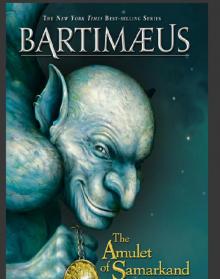 The Amulet of Samarkand
The Amulet of Samarkand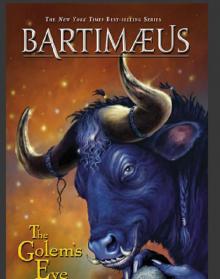 The Golem's Eye
The Golem's Eye The Screaming Staircase
The Screaming Staircase The Outlaws Scarlett and Browne
The Outlaws Scarlett and Browne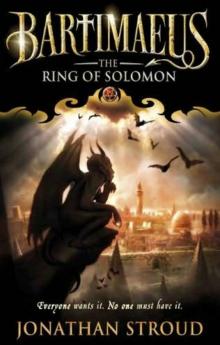 The Ring of Solomon: A Bartimaeus Novel
The Ring of Solomon: A Bartimaeus Novel Lockwood & Co
Lockwood & Co Lockwood & Co: The Screaming Staircase
Lockwood & Co: The Screaming Staircase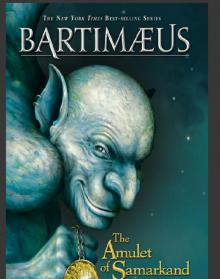 Bartimaeus: The Amulet of Samarkand
Bartimaeus: The Amulet of Samarkand The Amulet of Samarkand tbt-1
The Amulet of Samarkand tbt-1 Lockwood & Co.: The Creeping Shadow
Lockwood & Co.: The Creeping Shadow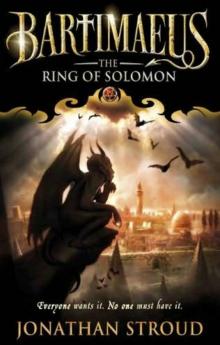 The Ring of Solomon
The Ring of Solomon Lockwood & Co. Book Three: The Hollow Boy
Lockwood & Co. Book Three: The Hollow Boy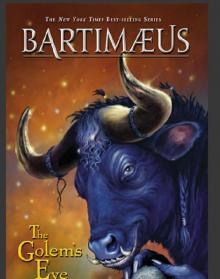 Bartimaeus: The Golem’s Eye
Bartimaeus: The Golem’s Eye